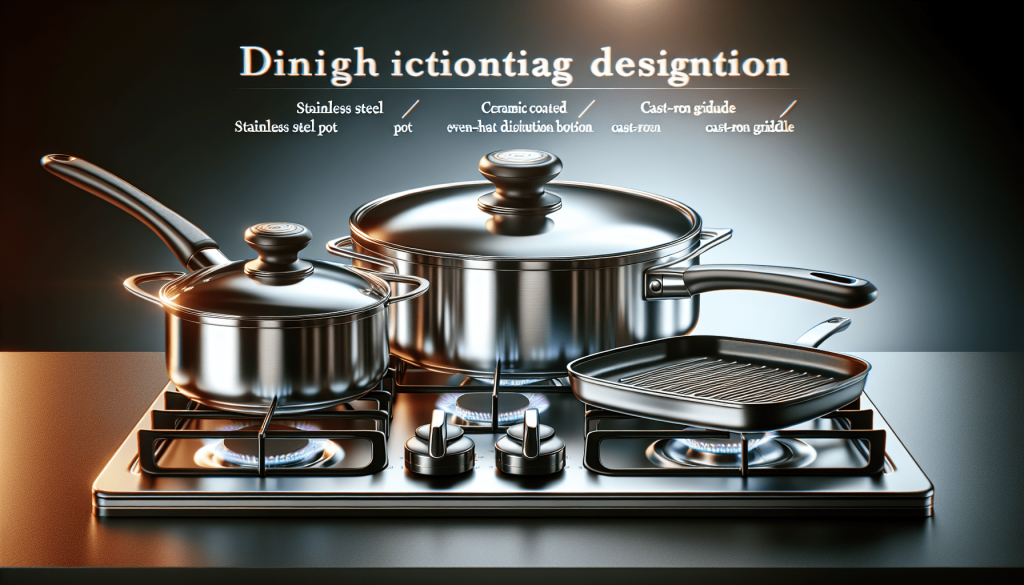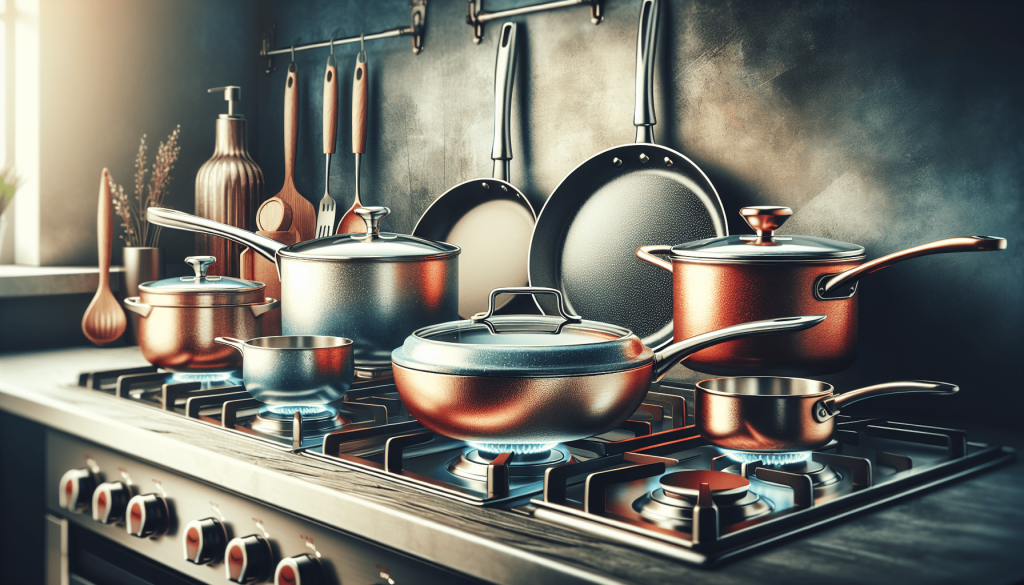In this article, we will guide you on how to select the perfect cookware for your gas stove. Whether you are a culinary enthusiast or a novice chef, finding the right pots and pans can make all the difference in your cooking experience. We will explore the key factors to consider, such as material, size, and compatibility, to ensure that your cookware not only withstands the high heat of a gas stove but also enhances the flavours of your delicious dishes. So let’s dive in and discover the secrets to choosing the right cookware for your gas stove!

Consider the Material
Choosing the right material for your cookware is crucial, as it will affect the overall performance and durability. Here are some popular materials to consider:
Stainless Steel
Stainless steel cookware is known for its durability and resistance to corrosion. It is a versatile option that can handle high heat and is suitable for a gas stove. Stainless steel cookware is also non-reactive, meaning it won’t leach any metallic tastes into your food. Additionally, it is easy to clean and maintain, making it a top choice for many kitchen enthusiasts.
Cast Iron
Cast iron cookware is a classic choice for gas stoves. It has excellent heat retention properties, allowing for even cooking and a beautiful sear. Cast iron is incredibly durable and can last for generations if properly cared for. However, it is important to note that cast iron cookware requires regular seasoning to maintain its non-stick surface. While it may be heavy, the benefits of cast iron’s performance make it a popular option for cooking on a gas stove.
Aluminium
Aluminium cookware is lightweight and has excellent heat conductivity. It heats up quickly and evenly, making it an energy-efficient option for gas stoves. However, pure aluminium can react with certain foods, especially those that are acidic or alkaline. To overcome this, many aluminium cookware sets are coated with non-stick materials or anodized to prevent any reaction.
Copper
Copper cookware is known for its superior heat conductivity, which allows for precise temperature control. It heats up rapidly and evenly, making it an excellent choice for gas stoves. However, copper is a reactive material and can interact with acidic foods, causing a metallic taste. To mitigate this, copper cookware is often lined with stainless steel or tin. Copper cookware requires regular polishing to maintain its shiny appearance, but the performance it offers is worth the extra effort for many cooking enthusiasts.
Evaluate Heat Conductivity
When cooking on a gas stove, heat conductivity is an important factor to consider. You want cookware that can distribute heat evenly and efficiently.
High Heat Conductivity
Materials such as copper and aluminium have excellent heat conductivity, allowing them to heat up quickly and distribute heat evenly across the cooking surface. This ensures that your food cooks evenly without any hot spots or cold areas. If you value precise temperature control and fast heat-up times, cookware with high heat conductivity is ideal for your gas stove.
Even Heat Distribution
In addition to heat conductivity, you should also consider cookware that provides even heat distribution. Cookware with thick, multi-layered bases or cores can help distribute heat more evenly, reducing the chances of your food burning or undercooking. This is especially important for recipes that require consistent heat throughout the cooking process.
Check Compatibility
Before purchasing cookware for your gas stove, it is crucial to check for compatibility with your specific stove type.
Check for Induction Compatibility
If you have an induction gas stove, you need to ensure that the cookware you choose is compatible with induction heating. Induction cooktops require cookware with a magnetic bottom, so make sure to look for induction-compatible labels or check with the manufacturer to ensure compatibility.
Gas Stove Compatibility
For a standard gas stove, the compatibility concerns are minimal. Gas stoves are generally compatible with a wide range of cookware materials, making it easier to find options that suit your needs. However, it’s still important to consider the other factors mentioned in this article, such as material, heat conductivity, and durability, to make an informed decision.
Consider Size and Weight
The size and weight of your cookware play a vital role in its functionality and ease of use.
Size of the Cookware
Choosing the right size of cookware is crucial to ensure that it fits your cooking needs. Consider the size of your gas stove’s burners and the amount of food you typically cook. Oversized cookware may not heat evenly and could result in inefficient cooking. On the other hand, cookware that is too small for your burners may not distribute heat properly. It’s best to choose cookware that matches the size of your stove burners for optimal performance.
Weight of the Cookware
The weight of the cookware is also an important consideration, especially if you do a lot of cooking and lifting. Heavy cookware, such as some cast iron options, can be cumbersome to handle and may require extra effort to move around. Lightweight options, like aluminium, can be easier to maneuver but may sacrifice some heat retention properties. Consider your own comfort level and strength when deciding on the weight of your cookware.

Look for Durability
Durability is a key factor when choosing cookware, as it directly impacts the longevity and performance of your pots and pans.
Quality of Construction
The quality of construction determines how well your cookware will withstand repeated use over time. Look for cookware with sturdy construction, such as encapsulated bottoms or riveted handles, as they tend to be more durable. Avoid cookware with thin or flimsy handles that may break or warp easily.
Non-stick Coating
If you prefer non-stick cookware, ensure that the non-stick coating is of high quality. Cheap or low-quality non-stick coatings can peel or wear off quickly, compromising the overall usability of the cookware. Look for cookware with reputable non-stick coatings that are proven to be long-lasting and safe for use with gas stoves.
Evaluate the Handle
The handle of your cookware plays a crucial role in the overall cooking experience. Here are some factors to consider when evaluating the handle.
Heat Resistance
A heat-resistant handle is essential to ensure safe handling while cooking. Look for cookware with handles that stay cool to the touch, even when exposed to high heat. This will prevent injuries and make it easier to move your cookware around the kitchen.
Comfortable Grip
Cooking can be a joyous experience, especially when your cookware provides a comfortable grip. Look for handles with ergonomic designs that fit well in your hand. Rubberized or silicone handles can provide added comfort and prevent slipping, ensuring a secure grip.
Sturdiness
The handle of your cookware should be sturdy and well-attached to the pot or pan. Handles that feel loose or flimsy can be a safety hazard and may detach from the cookware while in use. Opt for cookware with handles that are securely attached, preferably with rivets or screws, to ensure long-lasting performance.
Consider Maintenance
The ease of cleaning and maintenance of your cookware will directly impact your overall satisfaction with the product.
Ease of Cleaning
Look for cookware that is easy to clean, especially if you prefer handwashing your pots and pans. Smooth, non-porous surfaces are generally easier to clean and prevent food from sticking. Avoid cookware with complex designs or hard-to-reach corners that may trap food particles and make cleaning a tedious task.
Dishwasher Safe
If you prefer using a dishwasher to clean your cookware, check for dishwasher-safe labels. While most modern cookware is dishwasher safe, it’s still worth double-checking to ensure that your cookware can handle the dishwasher’s heat and detergents without losing its quality.
Special Maintenance Requirements
Some cookware, such as cast iron and copper, may have special maintenance requirements. Cast iron cookware needs to be properly seasoned and maintained to prevent rust and maintain its non-stick properties. Copper cookware may require regular polishing to keep its shine. Consider the extra effort that may be required to properly maintain these types of cookware and decide if it aligns with your preferences and lifestyle.
Check for Versatility
Versatility is always a desirable trait in cookware, as it allows for more flexibility and expands the range of dishes you can prepare.
Oven-Safe
If you frequently use your oven for cooking or finishing dishes, make sure the cookware you choose is oven-safe. Not all cookware materials can withstand high oven temperatures, so look for specific temperature ratings to ensure compatibility.
Broiler-Safe
Similarly, if you enjoy broiling or using the broiler function in your oven, check if the cookware you are considering is broiler-safe. Broiling can expose cookware to extremely high temperatures, so it’s important to ensure that your chosen cookware can handle the heat.
Consider Budget
Setting a budget is an important step in purchasing any product, including cookware.
Set Budget
Determine how much you are willing to spend on cookware and set a budget accordingly. Cookware is available at various price points, so having a budget in mind will help narrow down your options and make the decision-making process easier.
Evaluate Price vs. Quality
While it can be tempting to opt for the cheapest cookware option available, it’s crucial to evaluate the balance between price and quality. Keep in mind that investing in higher-quality cookware may ultimately save you money in the long run, as it tends to be more durable and performs better. Look for cookware that offers a good balance between price and quality, ensuring you get the best value for your money.
Take Reviews into Account
When making any purchase, it’s always a good idea to consider the opinions of others who have already used the product.
Customer Reviews
Read customer reviews online to gain insights into the performance, durability, and overall satisfaction of the cookware you are considering. Take note of any recurring positive or negative comments and use that information to make an informed decision.
Expert Opinions
Expert opinions from chefs, cooking enthusiasts, and reputable sources can provide valuable insights into the quality and performance of different cookware options. Check out cookware reviews from trusted sources to gather additional information that can help guide your decision.
By considering the material, evaluating heat conductivity, checking compatibility, looking at size and weight, considering durability, evaluating the handle, considering maintenance, checking for versatility, considering budget, and taking reviews into account, you can choose the right cookware for your gas stove. Happy cooking!
